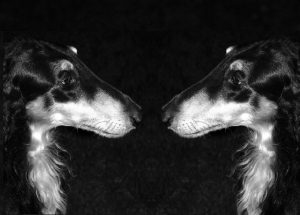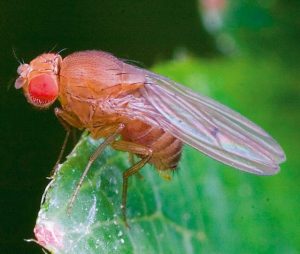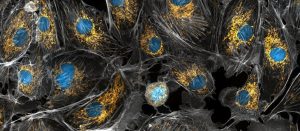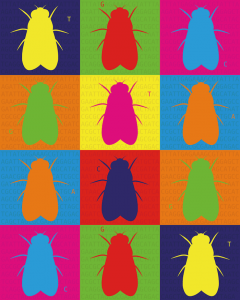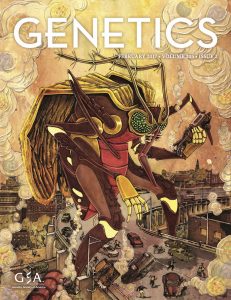Enter your address to receive notifications about new posts to your email.
Articles tagged Evolution
(108 results)
-
MPP People: Andrew Morgan
Multiparental populations (MPPs) have brought a new era in mapping complex traits, as well as new analytical challenges. To face these challenges and encourage innovation, the GSA journals launched the ongoing Multiparental Populations series in 2014. This month’s issues of GENETICS and G3 feature a bumper 16 MPP articles, timed to celebrate a new easy-to-use…
-
The push-and-pull evolution of tandem-duplicated drug-resistance genes
Two highly similar genes that contribute to drug resistance in a pathogenic yeast have been co-evolving as tandem duplicates for the past 134 million years—while maintaining distinct functions. This is the conclusion of a paper in the April issue of GENETICS by Lamping et al. that examines the evolutionary effects of ectopic gene conversion. Evolutionary…
-
Tools for transgenic studies in close relatives of D. melanogaster
Thanks to more than a hundred years of working with Drosophila melanogaster, geneticists have many powerful tools for precisely manipulating its genes. It has also become a model system for studying speciation and molecular evolution together with the other members of the melanogaster species group: D. simulans, D. mauritiana, D. yakuba, and D. santomea. However,…
-
Incompatibility between mitochondrial and nuclear genomes isolates many nematode populations
Constant mutation and shaping by natural selection can make the once-identical genomes of isolated populations of organisms very different from one another. This genetic divergence can lead to two such populations no longer being able to interbreed successfully—speciation. In their paper in the March issue of G3, Lamelza and Ailion show that harmful interactions between…
-
GSA / March for Science T-shirts now available!
GSA is an official partner of the March for Science—we hope you will join us in marching on Earth Day, April 22! You can now wear one of our fantastic new GSA March for Science T-shirts, available in two designs. All proceeds go to the non-profit, volunteer-run March for Science organization, supporting the major logistics costs…
-
50 years of molecular evolution in Drosophila
In the genomic era, population geneticists are flooded with molecular data on the evolution of natural populations. This deluge started in 1966 as a trickle of data from protein electrophoresis studies, including the landmark GENETICS papers published by Richard Lewontin and John Hubby. As Lewontin is honored this week at the Annual Drosophila Research Conference…
-
Richard Lewontin is awarded the 2017 Morgan Medal
We are pleased to announce that Richard C. Lewontin, PhD is the 2017 recipient of the Thomas Hunt Morgan Medal for lifetime achievement in the field of genetics. This award recognizes Lewontin’s extensive impact on our understanding of evolution, a broad and deep influence that has shaped the field. An unprecedented 160 distinguished biologists co-signed a…
-
David Kingsley awarded 2017 Genetics Society of America Medal
We are pleased to announce that David Kingsley, PhD is the 2017 recipient of the GSA Medal for outstanding contributions to the field of genetics in the past 15 years. His experimental work has shifted paradigms about how the physical traits of vertebrate organisms evolve. Kingsley is a Professor and Howard Hughes Medical Institute Investigator…
-
Behind the Cover: Attack of the 50 Foot Mosquito
When geneticist Rob Unckless took his son to Lego Club at the local library, he was not expecting to start a new collaboration. The result is the striking piece of science-inspired art that graces the cover of the February issue of GENETICS. Created by artist Kent Smith, “Attack of the 50 Foot Mosquito” was inspired…
-
The unique genetic variation of the Greenlandic Inuit population could help find novel disease associations
Despite being covered by a massive, permanent ice sheet, Greenland has been continuously inhabited by humans for over a thousand years. Most modern Greenlanders are Inuit whose ancestors migrated eastward from Canada around 1000 AD, bringing technology like kayaks and dogsleds. They eventually settled on the coasts of the world’s largest island, hunting whales and…
-
Dog pedigrees shed light on recombination
Recombination within the genome isn’t random. This swapping of DNA segments between one chromosome and its homolog preferentially affects specific genome regions called hotspots. These regions can have recombination rates many times higher than other areas of the genome, and the rapid shuffling of genetic information is thought to be important in evolution. The location…


